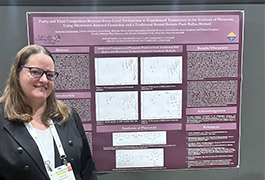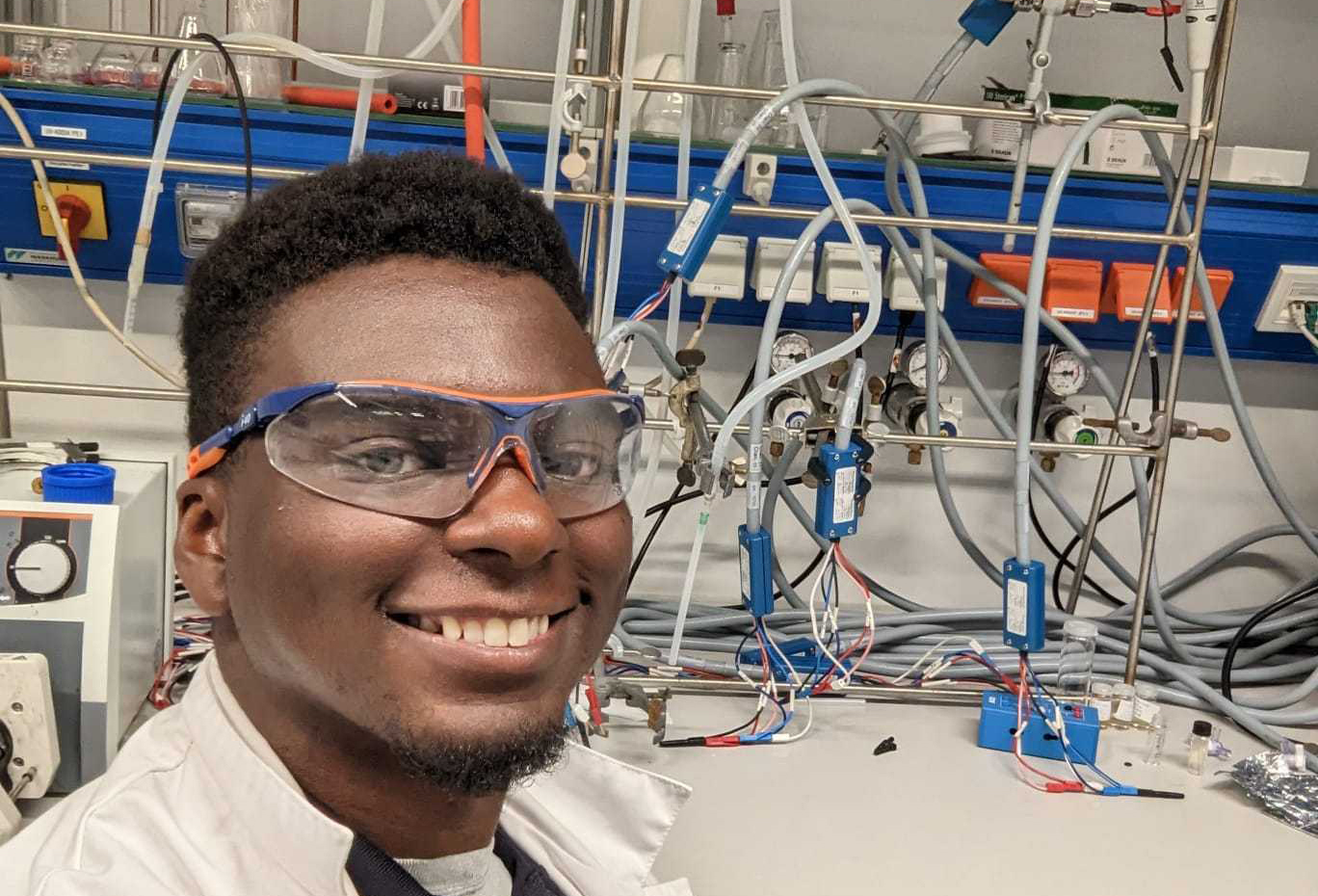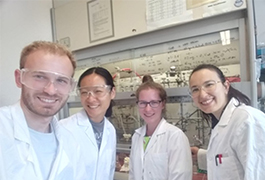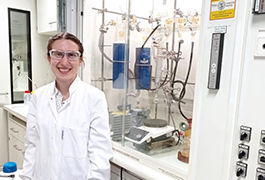You’re Studying What?
As a chemistry major, one of the most difficult things you have to deal with isn’t calculus or physical chemistry; it’s the reaction you get from almost everyone you know about why you chose the chemistry field as a discipline of study.
“Isn’t chemistry hard?” ... “Aren’t there easier ways to get into medical school?” ... “I didn’t realize you were one of those people!” …. “Don’t you want a life?” … “Oh, I hated chemistry!” Even well-meaning statements, like “You must be soooooo smart,” can make you feel isolated and awkward.
There is a lot of emphasis right now on communicating science to the general public — including an effort by the ACS president. But what’s talked about less often is the dilemma of explaining to family and friends why you want to study chemistry.
You’re excited about your classes and research, but how do you share that excitement with someone who doesn’t know an alkane from an alkaline metal? And how do you justify long hours in the lab when your family may be facing immediate challenges at home?
Well, I’ve got a few solid tips and words of advice from your peers that will help you share what you love with those you care about most.
Break down the long hours
Many students of other majors have lectures and classes that end by early afternoon. That’s not the case for chemistry majors. You have labs that run into the early evening (or beyond), plus problem sets and reports that can take you all night to finish.
How do you tell your friends that you aren’t available for that mid-afternoon snack run or a weekday party? Or get your family to understand that you really do need the entire weekend to study?
To put it simply, what you have to do is show them! You could describe what is involved in calculating exactly how much calcium is “hidden” in that clear and colorless solution for your analytical homework.
You could also give them a tour of your lab as you explain your exciting research in water purification. Many professors are happy to offer a half hour of their time to help expose your family and friends to your world. In doing so, they can provide a clear understanding of the commitment required for a chemistry degree.

Lana Nitti of Utica College in New York tries to illustrate specifically what she is studying when she can’t accept an invitation. “When I make the effort to explain why my field takes time,” she explains, “my non-chemist friends find it really cool that I am a scientist.” Nitti also makes sure her friends don’t feel forgotten. If she can’t make a movie, she’ll ask to meet up at a time when she is available (e.g., when the lab is closed).
Make clear that chemistry is your training ground
For some students, their college major is a field of study; for chemistry majors, however, it’s professional training. When you graduate, you will be ready to enter the workforce as a chemistry professional, even if you’re planning to first go to graduate school. Chemistry professionals need skills that can’t be honed in a dorm room or on the subway. To learn air-sensitive synthetic techniques, for example, you must learn them in a fume hood in a laboratory…with supervision, which is only available at specific times.
Sometimes loved ones and friends might not really understand what you can do with a chemistry B.S. degree, much less a Ph.D. — after all, you’re working so hard before you even have a job.
For Nitti, focusing the conversation on the benefits of a chemical career helps her grandparents appreciate the sacrifices that she is making in the short term. “I tell my family that I am working very hard now so that I can have a more secure life later,” Nitti says. When trying to put in context her goal of earning a Ph.D., she uses phrases like “financial stability,” “good benefits,” and “a rewarding, intellectual workplace where I’m free to decide what I study, and how.”
Even if you aren’t yet sure what you want to do with your degree, a resource like College to Career offers a substantial amount of information about careers in chemistry. You can use such resources for ideas that will help you describe all the possibilities your major opens up for you.
Relate it to sports
Some students use a sports analogy. For example: College football players spend long hours on the football field preparing for games and NFL recruiters, yet no one thinks twice about the demands of their training schedules. Likewise, you spend long hours in the laboratory training and practicing to be a chemist … and sometimes, you even get published!
Just as a football player needs to be on campus to fulfill training obligations, there are assignments that require chemistry majors to be on campus in order to study and learn, or that demand big chunks of your time. The reality is you have less flexibility with your time than do students in other majors, and the sports analogy can help illuminate this fact to both parents and friends.
Keep in mind, though, that some of your peers are “stealing time” by mixing work with leisure. For example, the movie plans made by your friend in economics camouflages the time they’ll spend reading a textbook on the bus, and drafting a report at Starbucks, not to mention the all-nighter they’ll pull in dorm afterward.
Meet them where they are

Erika Weir of Brigham Young University in Utah says that decoding chemistry to friends and family is complicated. “It’s like playing a game of Taboo,” she says. “You know what you are trying to say, but there are multiple words you can’t use.” Of course, unlike the game, the challenge with talking about chemistry to non-chemists is that your audience doesn’t know the terms you would normally use to discuss it. How do you talk about organic analysis without NMR? How do you explain NMR without deuterated solvents? And how do you explain deuterated solvents without explaining isotopes?

Karthik Mayilvahanan at University of California, Berkeley, adds that the more you know about a subject, the more difficult it is to describe it in a way that anyone can understand. “The more progress I make in my research topic,” he says, “the more difficult it is to not include all the technical knowledge I have gained.”
To help counter losing people in translation, Mayilvahanan uses non-technical terms and navigates the discussion via big-picture questions. His approach is to start with the macro world, move down to the molecular realm, and then bring the conversation back to the macro world.
Macro-Micro-Macro Example
When explaining how chemists design plastics, you might start with something macro scale, like how grocery bags and milk jugs are both plastic polymers (large molecules made up of many repeated units), yet act very differently from each other. Then go to micro scale by telling a bit about how polymers are made up of monomer units.
You could follow with explaining that monomer units are just small, repeating, molecular building blocks and how, even with the same building block, you can get different chain shapes, including long (polymer), straight, or branched. Then you might hit your audience with the fact that chemists can control these shapes — and, therefore, their properties.
Once you’ve opened your audience’s eyes to some of the amazing intricacies of molecules, you can reach back to the macro scale, explaining that a chain with very little branching can yield polymers that pack together really tough material needed to manufacture milk jugs.
Last but not least, you could add that polymers with many small branches off a long chain are better at becoming films because the branches cause some separation between the lego-like stacking of molecule chains. The extra spacing makes the structure less solid and, therefore, more flexible.
Antonio LaPorte from Northern Central College in Illinois agrees with the macro-to-micro approach. When he talks about his ionic liquids research, he starts by answering questions like, “How do we know…?” and “Why do we care?”
“I make sure my audience understands my research in very general terms by using examples, such as batteries, before I get into specifics,” he says, “and then I build from there to explain how changing properties could lead to favorable effects.”
Find chemistry confidantes
While you always stick to your family and friends, having people who share your love of chemistry is also important. Weir was thrilled when, after a long day in the laboratory, she finally synthesized pure aspirin. To the non-chemist, it was underwhelming. Why make aspirin when you can just buy it in the store? But her fellow chemistry majors understood the accomplishment and celebrated with her. When talking about something as simple as how her week went, she found that talking with majors who ‘get it’ and share her passion helps her stay motivated.
Making a few like-minded friends in your chemistry class or student chapter will help keep you focused on why you chose your major and your path. For instance, Weir finds that mentoring freshmen helps her develop the explanations she needs when talking with her family.
In so many ways, majoring in the chemical sciences forces you into the role of a chemical ambassador. You can use this platform to make the major your own. What do you like about chemistry? What keeps you going when P-chem gets tough? Think about these things, try some of the tactics in this article, and hopefully you’ll find the confidence to keep working hard and succeeding. Good luck!






